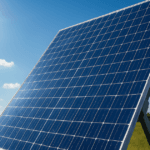
Rooftop Solar vs Ground-Mounted Solar: What’s Right for You
In the ever-evolving landscape of renewable energy, solar power has emerged as a frontrunner, offering a sustainable and increasingly cost-effective solution for energy needs. This comprehensive blog post will help you deep into the Refinements of both options rooftop solar vs ground mount solar, providing a detailed comparison to help you make an informed decision to your specific circumstances. We will study the pros and cons of each system concerning space available, energy requirements, cost issues, installation complexities, maintenance necessities, and aesthetic aspects.
Understanding Rooftop Solar Systems
In general, rooftop solar systems entail mounting photovoltaic panels onto the existing roof of a structure, whether a residential house, a commercial business, or an industrial establishment. This methodology uses space not otherwise being used, and hence, it becomes even more interesting to consider in areas like Gurugram where land is truly a premium and the population density is high.

Advantages of Rooftop Solar:
- Space Efficiency: One of the most important advantages of rooftop solar energy systems is the excellent use of available space. It is duly significant in urban settings where land space is restricted.
- Lower Installation Costs (Potentially): In many cases, rooftop solar installations can have lower upfront costs compared to ground-mounted systems. The existing roof structure is being put to good use, thereby reducing the extent of mounting structures required as well as the need to prepare land.
- Reduced Visual Impact: Solar panels on rooftops usually integrate into the building design, leading to less visible impact compared to arrays set up on the ground. This is a huge consideration for homeowners and businessmen who are conscious of aesthetics.
- Simplified Permitting (Potentially): On the basis of local regulations in Gurugram, rooftop solar installations are likely to be less cumbersome with regard to permits than ground-mounted ones, which might involve land-use considerations.
- Net Metering Benefits: Typically, rooftop solar systems are eligible in net metering programs, by feeding excess generated energy back to the grid and receiving electric bill credit. It may save a considerable amount of cost in time.
Disadvantages of Rooftop Solar:
- Limited Space and Scalability: Space on rooftops determines the generation capacity of energy in a rooftop installation. This may not be adequate to satisfy the energy demand of large industrial units or facilities consuming an extensive quantity of energy.
- Roof Integrity Concerns: Air conditioning might penetrate through the roof while in the process of installation and if that is improperly done, it could lead to leaks or such problems with the structure later on. So, it is quite important to ensure that the right installation is done by trained persons after installation.
- Shading Issues: The obstructions causing shadows on the solar panels, hence reducing efficiency and energy output, include nearby trees, taller buildings, or even parts of your own roof.
- Maintenance Challenges: Cleaning and servicing panels on rooftops might turn out to be a bit more difficult at times, and there may be a need for specialized equipment or safety measures involved in it.
- Potential Impact on Roof Lifespan: Solar panel systems can protect the roof below them from the effects of weather; however, the installation and presence of the system itself may affect the lifespan of the roof.
- Orientation and Tilt Limitations: The azimuth and tilt of the rooftop may not be fixed toward capturing maximum solar energy, and this could lead to a lower efficiency than that found in ground-mounted systems, which offer greater flexibility in positioning the panels.
Exploring Ground-Mounted Solar Systems
Ground-mounted solar systems include fixed PV panels found in ground support structures. Open grounds receive installation of such structures since these systems can feasibly be used for large-scale projects like solar farms, big industrial sites with lots of land, and agricultural applications.

Advantages of Ground-Mounted Solar:
- Optimal Positioning and Efficiency: Ground-mounted systems offer the flexibility to position the solar panels at the ideal tilt angle and orientation to maximize sunlight capture throughout the day and year. This can lead to higher energy generation efficiency compared to rooftop systems with fixed roof angles.
- Scalability and Flexibility: These systems can be easily scaled up to meet larger energy demands by adding more panels as needed. The modular nature of ground-mounted arrays provides greater flexibility in system design and expansion.
- Easier Maintenance and Accessibility: Ground-level access makes cleaning, inspection, and maintenance of the solar panels and mounting structures significantly easier and safer compared to rooftop systems.
- No Roof Limitations: Ground-mounted systems are not constrained by the size, shape, or structural integrity of a building’s roof, making them suitable for properties with unconventional roof designs or limited roof space.
- Potential for Dual Land Use (Agrivoltaics): In some cases, the land beneath ground-mounted solar panels can be utilized for agricultural purposes (agrivoltaics), creating a synergistic benefit.
- Better Ventilation and Cooling: The open design of ground-mounted systems allows for better air circulation around the panels, which can help keep them cooler and improve their performance, as solar panel efficiency can decrease at higher temperatures.
Disadvantages of Ground-Mounted Solar:
- Increased Land Requirement: A significant drawback of ground-mounted solar is the need for dedicated land space. This can be a major constraint in areas with limited land availability or high land costs.
- Higher Upfront Costs (Potentially): The installation of ground-mounted systems often involves higher initial costs due to land preparation, the construction of support structures, and potentially longer wiring runs.
- Visual Impact: Large ground-mounted solar arrays can have a more significant visual impact on the landscape compared to rooftop systems, which might be a concern for some property owners or communities.
- Security Concerns: Ground-level installations might be more vulnerable to theft or vandalism compared to rooftop systems. Implementing appropriate security measures can mitigate this risk.
- Potential for Environmental Impact: Depending on the scale and location, ground-mounted solar farms could potentially have some environmental impact, such as habitat disruption or changes in land use. Careful planning and environmental assessments are crucial.
Rooftop vs. Ground-Mounted: Which Shines Brighter for You in Gurugram?
The optimal choice between rooftop and ground-mounted solar for your property in hinges on a careful evaluation of your specific needs and circumstances. Consider the following factors:
- Space Availability: If you have ample unused land, a ground-mounted system offers greater flexibility and scalability. However, if land is limited, rooftop solar is the more practical solution.
- Energy Requirements: Assess your current and future energy consumption. If your needs are high and your roof space is insufficient, a ground-mounted system might be necessary to accommodate a larger array.
- Budget: Compare the upfront and long-term costs of both options, considering installation, maintenance, and potential savings through net metering.
- Aesthetics: Determine your preference regarding the visual impact of the solar installation on your property.
- Roof Condition and Age: If your roof is old or in poor condition, you might need to factor in the cost of repairs or replacement before installing rooftop solar.
- Shading: Analyze potential shading issues on your roof that could impact the performance of a rooftop system. Ground-mounted systems offer more flexibility in avoiding shaded areas.
- Maintenance Preferences: Consider your comfort level with maintaining a rooftop system versus the easier accessibility of a ground-mounted array.
- Local Regulations and Incentives: Research the specific regulations, permits, and financial incentives available for both rooftop and ground-mounted solar.
Conclusion: Illuminating Your Path to Solar Energy
Both rooftop and ground-mounted solar systems offer compelling pathways to clean and sustainable energy. Rooftop solar excels in its efficient use of existing space and can be a cost-effective solution for many homeowners and businesses with moderate energy needs.
On the other hand, ground-mounted solar provides greater flexibility, scalability, and optimal positioning for maximizing energy generation, making it ideal for larger-scale applications and properties with ample land.
By carefully weighing the advantages and disadvantages of each system in the context of your unique requirements and local conditions, you can make an informed decision that will illuminate your path towards a brighter, more sustainable energy future in Gurugram, Haryana. Consulting with experienced solar installers in the region can provide further guidance tailored to your specific property and energy goals.









